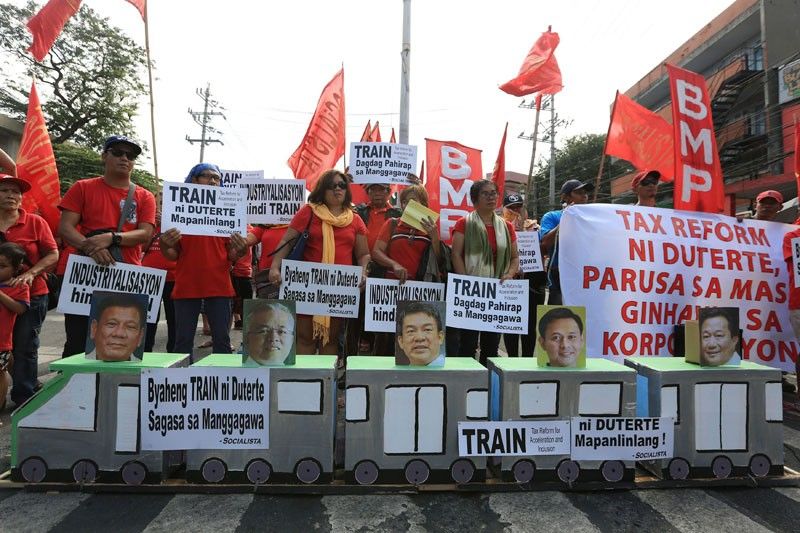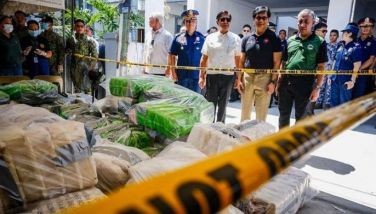Joblessness feared over second TRAIN

MANILA, Philippines — As people reel from soaring prices of fuel and other consumer goods, the country’s largest labor group yesterday warned of possible mass displacement of workers with the passage and implementation of part two of the Tax Reform for Acceleration and Inclusion (TRAIN 2) law.
The Trade Union Congress of the Philippines (TUCP) said TRAIN 2, set to be implemented later this year even as calls snowball for the repeal of TRAIN 1, could hurt workers more by removing tax subsidies or incentives.
Economic managers have opposed any suspension or repeal of TRAIN 1 and are pushing for the speedy passage of TRAIN 2 to finance infrastructure projects. Budget Secretary Benjamin Diokno recently told TV 5 that rising world crude prices were to blame, not fuel excise taxes under TRAIN 1, for the surge in local pump prices.
“There are very real fears that changing the tax regime at this time and removing tax subsidies may cause the relocation of certain industries. This will translate to job losses,” TUCP said in a statement.
TUCP urged Congress and the Department of Finance to further study how TRAIN 2 could benefit ordinary people and consumers.
Rep. Carlos Zarate of Bayan Muna said most Filipinos became poorer by P12.5 billion in the first three months of this year alone due to the TRAIN law.
He said P12.5 billion is the amount of additional taxes the Bureau of Internal Revenue (BIR) has collected since the implementation of TRAIN in January up to March.
Zarate said poor families, workers and the middle class were the ones that contributed most of the amount to the national treasury.
He cited a study by research and advocacy group Ibon Foundation, which showed that TRAIN adversely affects 60 percent of Filipino families, while the upper 40 percent are benefitting from it.
There are two pending TRAIN-related proposals in the House of Representatives. Opposition congressmen are seeking the suspension of the law while it is being reviewed, while the Bayan Muna-led Makabayan bloc of seven party-list representatives wants it repealed.
“The law is detrimental to a majority of the Filipino people. What is needed now is not just a mere review or suspension of TRAIN. The situation necessitates its repeal,” Zarate said.
He said Filipinos do not feel the reported 6.8-percent growth of the economy because of higher prices of products and services caused by the tax reform law.
President Duterte’s economic managers have frowned upon proposals in both the House and the Senate to amend the TRAIN law.
Finance Secretary Carlos Dominguez III has said the suspension or repeal of the statute would deprive the government of funds for the increased salaries of soldiers and policemen, and the free education program in state universities and colleges.
“We need not wait anymore for even more adverse effects, more price shocks, affecting especially the poor, before Congress should decisively act. Hundreds of workers of Coca-Cola were laid off, prices of petroleum products have been going up,” Zarate said.
He said rice, which is supposed to be value added tax-exempt, became more expensive by at least P2 per kilo, while prices of meat products like beef, chicken and pork rose by P10 to P20 per kilo.
Zarate lamented that administration officials like Dominguez continue to insist that TRAIN has minimal impact on consumer prices.
Transparency
Senators are demanding transparency from economic managers on the actual adverse effects of the TRAIN law amid mounting calls to suspend the law blamed for the spike in prices of fuel and other consumer goods.
Sen. Joseph Victor Ejercito said yesterday he voted for TRAIN based on the Senate version that included safeguards and safety nets, especially for the poor.
Ejercito and Sen. Paolo Benigno Aquino IV said the economic managers did not foresee inflation reaching 4.5 percent.
“Did they know that inflation will breach four percent despite their repeated assurances the TRAIN will not be as inflationary as feared?” Ejercito said.
“I think they should tell us everything so we can take the proper action based on accurate assumptions and data to temper the effects of TRAIN,” he said.
Ejercito said he is still finding out how and why the provision to suspend excise taxes on fuel when inflation exceeds four percent, which he proposed, was deleted from the Senate version.
He said the DOF late last year projected inflation this year to range from two to four percent only.
Inflation hit 4.5 percent last April.
Last February, or a month after TRAIN took effect, the Bangko Sentral ng Pilipinas revised the inflation forecast to 4.3 percent on average.
Ejercito and Senate President Pro Tempore Ralph Recto said the TRAIN law also provides that increased excise taxes on fuel will be suspended if the price of oil per barrel exceeds $80.
Rollback needed
Aquino lamented the effects of TRAIN are aggravated by the hike in power rates.
Aquino said an immediate rollback of fuel prices to pre-TRAIN law rates should be implemented to ease the burden on Filipino consumers.
While he welcomed the statement of Malacañang about being open to the suspension of the implementation of the excise tax on fuel, Aquino pointed out that this is already provided under the TRAIN law and would have no immediate impact on pump prices.
Aquino explained that the provision in the TRAIN law calls for the suspension of the increase in the excise tax on fuel when the price of crude oil in the world market breaches $80 per barrel.
He said this would only apply to further increases in the excise tax rate that would take effect in January 2019 and again in January 2020.
“What the people want is something immediate. They can no longer afford to wait because they are already drowning from the continued rise in the price of goods,” Aquino said.
Aquino said he has been going around the country to ask the people how they are coping with inflation.
He said poor families have been reeling from the increase in the price of goods and that many of them could now only afford to eat once a day.
While he acknowledged that the TRAIN law is not solely to blame for the rise in the prices of goods, Aquino said this was something that could be tweaked so that an immediate impact could be felt by consumers.
Aquino has filed Senate Bill 1798, which calls for the suspension of the imposition of the excise tax on fuel based on inflation.
“Under this bill, when inflation exceeds the target range for three consecutive months, the excise tax on fuel will be rolled back,” Aquino said in a privilege speech he delivered yesterday.
The bill introduced by Aquino was actually incorporated in the Senate’s version of the TRAIN when it was approved last year but it was deleted during the bicameral conference committee meetings on the bill.
Apart from passing his proposed bill, Aquino urged the government to immediately implement the unconditional cash transfer provision of the TRAIN law, which would provide 10 million poor families with a cash grant of P200 per month.
He lamented that close to five months into the implementation of TRAIN, only 2.6 million of the 10 million families have received the cash grant.
Sen. Risa Hontiveros, in response to Aquino’s speech, said the TRAIN law has a “big uncompensated impact” on large families and individuals earning less than minimum wage.
“The law is asking people who have already suffered so much in life to make more uncompensated sacrifices,” Hontiveros said.
“In fact, according to our own estimates, using the DOF’s own micro simulation, 1.7 million near poor wage earners are in danger of becoming poorer. The cash transfers provided by the TRAIN bill to cushion the impact of the new tax measure to the poor are not enough,” she added.
Hontiveros said the TRAIN law would have been more acceptable if it lowered the value added tax (VAT) rate and if monthly transfers to the poor were made available for a longer period of time corresponding to the phased implementation of fuel excise tax increases.
In a tweet yesterday, Sen. Panfilo Lacson recalled how he pushed for removal of a total 143 VAT exemptions granted by the government over the years and for the reduction in VAT rate to 10 percent.
Lacson said his proposal would have negated the need to impose an increase in the excise tax on fuel.
“I don’t regret voting against the measure,” he said. – With Marvin Sy, Jess Diaz, Paolo Romero
Related video:
- Latest
- Trending


























